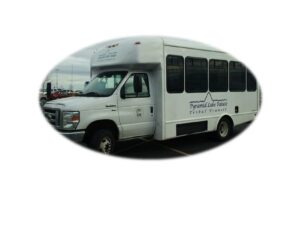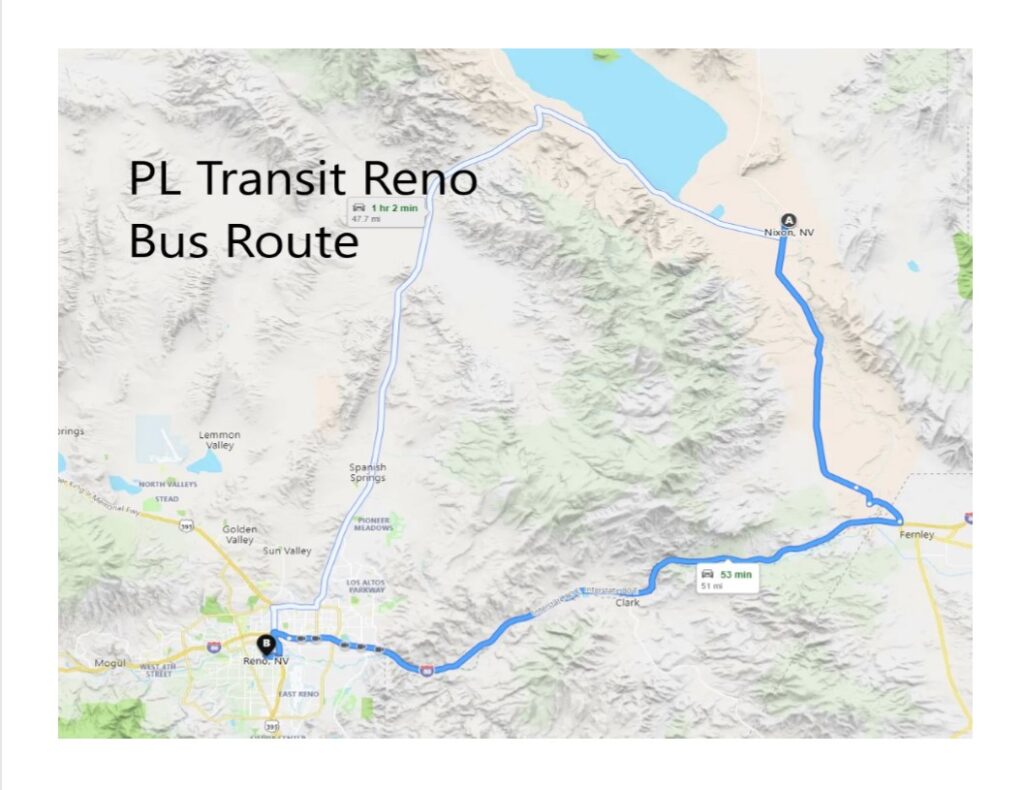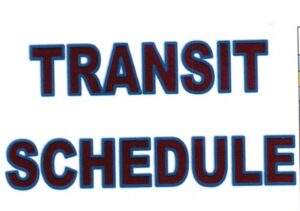Pyramid Lake Paiute Tribal Transit

Phone: (775) 574-2410
Director: Michele Smith
Facebook Page: PL Paiute Tribal Transit

MISSION STATEMENT:
To administer an effective, efficient and safe public transportation service by providing transit services to access health care, social welfare, employment opportunities, job training, shopping and recreation on and off of the Pyramid Lake Paiute Reservation.
For more information, please call the PL Transit Team at (775) 574-2410.

Pyramid Lake Paiute Tribe Transit Policies and Procedures Manual
Purpose: To ensure the safety of PLPTT clients and passengers as well as PLPTT employees and drivers.
Policy Statement: Sometimes in today’s fast-moving world, we are often in such haste to get things done that we often forget to consider our safety and that of others around us. PLPTT has established these guidelines to help ensure the safety of our passengers, employees, and drivers.
To read the manual, please click on the link: PLPTT Policies & Procedures Manual
State Management Plan
BACKGROUND AND INTRODUCTION
Authorizing Federal Legislation
The Federal Transit Act, as amended, includes formula grant programs for the Sections 5310, 5311 and 5339 programs. The Federal Transit Act has been reauthorized by Congress under the Fixing America’s Surface Transportation Act (FAST Act), which was signed into law by President Barack Obama on December 4, 2015. The effective date of the legislation was October 1, 2015 and authorizes the federal transit programs for five years (federal fiscal years 2016-2020), through September 30, 2020.
Title 49 U.S.C. 5310 authorizes the formula assistance program for the Enhanced Mobility of Seniors and Individuals with Disabilities Program (Section 5310) and provides formula funding to states and designated recipients to improve mobility for seniors and individuals with disabilities. Program guidance can be found in the FTA Circular 9070.1G, https://www.transit.dot.gov/regulations-and-guidance/fta-circulars/enhanced-mobility- seniors-and-individuals-disabilities), which was issued on July 7, 2014.
The Federal Transit Act, as amended, also includes a formula grant program for rural areas known as Section 5311. The Section 5311 program (Title 49 U.S.C. 5311) provides financial assistance to states for capital, administrative and operating expenses to rural areas for local public transportation services. The FTA Section 5311 Program Guidance Circular (the FTA Circular 9040.1G, https://www.transit.dot.gov/regulations-and-guidance/fta-circulars/formula- grantsrural-areas-program-guidance-and-application) was issued by the FTA on November 24, 2014. This grant program also includes the Rural Technical Assistance Program (RTAP) and the Intercity Bus Program (5311(f)).
A formula grant program to assist eligible recipients in financing capital projects to replace, rehabilitate and purchase buses and related equipment and to construct bus-related facilities is included in the Federal Transit Act (USC Title 49, Chapter 53), as amended, known as Section 5339. The FTA apportions Bus Program funds for urbanized areas to the states and designated recipients, which are responsible for receiving and apportioning the FTA funds to eligible projects and applying for funds on behalf of all eligible subrecipients within the applicable urbanized area or rural areas. The FTA will apportion the funds to existing Section 5307 or new Section 5339 designated recipients for large urbanized areas and to the states for all areas under 200,000 population. It is codified at 49 U.S.C. 5339 and program guidance can be found in the FTA C 5100.1 Circular (https://www.transit.dot.gov/sites/fta.dot.gov/files/docs/Final_FTA_C_5100_4-1615.pdf) which was issued on May 18, 2015.
State Program Responsibility
The Governor of Nevada has designated the Nevada Department of Transportation (the NDOT) as the state’s administering agency for the FTA Sections 5310, 5311 and 5339 programs. The 2 NDOT Multimodal Planning Division, Transit Office is responsible for the day-to-day program and fiscal management and oversight.
This combined State Management Plan (SMP) documents the state’s objectives, policies, procedures and administrative requirements for all three federal programs, including the distribution and oversight of federal funds to assist public, Tribal, private for-profit and private nonprofit passenger transportation systems operating throughout the state, in a form that is readily accessible to the NDOT staff, the FTA, subrecipients, potential subrecipients and the public. It is reviewed on a periodic basis to ensure that any new federal regulations are reflected in the plan. It is more thoroughly revised with each federal transportation funding bill signed into law.
Note: In this document, the terms grantee, subgrantee, applicant and subrecipient are used interchangeably depending upon the language and circumstances in the FTA Circulars or Master Agreement and refer to the entities applying to the NDOT for funding under one or more of the FTA programs
You can read the plan here: State Management Plan
Long Range Transportation Plan
The purpose of this study is to identify and evaluate present and future transportation needs of the Pyramid Lake Paiute Tribe. Present needs are determined by evaluating present conditions including traffic volume, existing hazards, the conditions of roads and other transportation infrastructure, and the current goals of the Pyramid Lake Tribe. Future needs are evaluated based on the Tribe’s social, economic and development goals and objectives, including specific development proposals, and the land use and transportation plans of the surrounding area. Transportation planning on the tribal level is a critical part of the overall system of prioritizing and funding transportation improvements on tribal lands. Federal transportation legislation, implemented by BIA regulations, requires that tribal transportation improvement projects, in order to be funded by federal sources, must be a part of an adopted Long Range Transportation Plan (LRTP). The LRTP is the result of a transportation planning process with a 20-year time horizon. The planning effort for the Tribe began with an update to the inventory of the Indian Reservation Roads (IRR) system on the Pyramid Lake Reservation. It continued with the preparation of this Long Range (20 – Year) Transportation Planning Study. The study includes a Transportation Improvement Projects Priority List that will be forwarded to the BIA for the preparation of an IRR Transportation Improvement Plan (TIP) for the Pyramid Lake Paiute Tribe.
You can read PLPTT’s plan here: Long Range Transportation Plan
LEP (Limited English Proficiency Plan) PLAN
The Pyramid Lake Paiute Tribal Transit (PLPTT) is a recipient and subreciplent of federal financial assistance and grants from Federal Transit Administration (FTA) and Federal Highway Administration (FHWA). As such, PLPTT must comply with Executive Order 13166- Limited English Proficiency (LEP).
This LEP Plan is designed to assist PLPTT management and staff to understand their roles and responsibilities with respect to overcoming barriers for LEP individuals. This LEP Plan will provide guidance to staff on translation, interpretation, and outreach services for LEP individuals seeking access to PLPTT programs and services. This LEP Plan supplements PLPTT’s Title VI Program Plan and the Public Participation Plan.
PLPTT developed this LEP Plan by using the Federal Transit Administration (FTA), Office of Civil Rights “Policy Guidance Concerning Recipients’ Responsibilities to Limited English Proficient Persons” handbook and performing the Four-Factor analysis therein.
B. POLICY STATEMENT
PLPTT, under Title VI of the Civil Rights Act of 1964, ensures that no person shall, on the basis of race, color or national origin, be excluded from participation in, be denied the benefits of, or be otherwise subjected to discrimination under any program or activity it administers.
As clarified by Executive Order 13166, Improving Access to Services for Persons with Limited English Proficiency and resulting agency guidance, national origin discrimination includes discrimination on the basis of limited English proficiency. It is the policy of PLPTT to provide timely, reasonable, effective and meaningful access for LEP persons to all its programs and activities. All staff shall provide free language assistance services to LEP individuals with whom they encounter or whenever an LEP person requests language assistance services. All staff shall ensure the public is treated with dignity and respect, identify the language needs of PLPTT customers, and utilize available bilingual resources to assist customers, when needed.
PLPTT will ensure the provisions of this LEP Plan will apply and be incorporated into agreements with subgrantees and contractors as subrecipients of federal financial assistance.
Please click here to read the LEP: Limited English Proficiency (LEP) Plan
Title VI Implementation Plan
Title VI of the Civil Rights Act of 1964 prohibits discrimination on the basis of race, color, or national origin in programs and activities receiving Federal financial assistance. Specifically, Title VI provides that “no person in the United States shall, on the grounds of race, color, or national origin, be excluded from participation in, be denied the benefits of, or be subjected to discrimination under any program or activity receiving Federal financial assistance (42 U.S.C. Section 2000d).
The Civil Rights Restoration Act of 1987 clarified the intent of Title VI to include all programs and activities of Federal-aid recipients, and or contractors whether those programs and activities are Federally funded or not
Executive Order 13166 placed renewed emphasis on Title VI issues, to ensure meaningful and equal access in programs and activities to persons with Limited English Proficiency (LEP).
Recipients of public transportation funding from Federal Transit Administration (FTA), and the Nevada Department of Transportation (NDOT), are required to develop policies, programs, and practices that ensure Federal Transit dollars are used in a manner that is nondiscriminatory as required under Title VI.
This document details how the Pyramid Lake Paiute Tribal Transit (PLPTT) incorporates nondiscrimination policies and practices in providing services to the public.
Please click here to read Pyramid Lake Paiute Tribal Transit System-Wide Service Standards and Policies: System-Wide Service Standards and Policies
Please click here to read the Title VI Implementation Plan: Title VI Implementation Plan – PLPTT Updated & Revised 9-20-24
Please click here to read the Title VI Policy Statement: TITLE VI POLICY STATEMENT
Please click here to read the Title VI Non Discrimination Notice: Title VI Non Discrimination Notice
Please click here to see Title VI Complaint Procedure PDF: TITLE VI COMPLAINT PROCEDURES
Complaint Forms (English/Spanish): PLPTT TITLE VI COMPLAINT FORMS
Pyramid Lake Paiute Tribal Transit ADA (Americans with Disabilities Act) Plan
In accordance with the requirements of Title II of the American with Disabilities Act of 1990 (ADA), will not discriminate against qualified individuals with disabilities on the basis of disability in its services, programs or activities.
Employment: Pyramid Lake Paiute Tribal Transit (PLPTT) does not discriminate on the basis of disability in its hiring or employment practices and complies with all regulations promulgated by the U.S. Equal Employment Opportunity Commission under Title I of the ADA.
Effective Communication: PLPTT will generally, upon request provide appropriate aids and services leading to effective communication for qualified persons with disabilities so they can participate equally in Pyramid Lake Paiute Tribe’s programs, services and activities including qualified sign language interpreters, documents in Braille and other ways of making information and communications accessible to people who have speech, hearing or vision impairments.
Modifications to Policies and Procedures: PLPTT will make all reasonable modifications to policies and programs to ensure that people with disabilities have an equal opportunity to enjoy all of its programs, services and activities. For example, individuals with service animals are welcomed in PLPTT offices, even where pets are generally prohibited.
• Anyone who requires an auxiliary aid or service for effective communication, or a modification of policies or procedures to participate in a program, service or activity of PLPTT should contact the office of PLPTT at 775-574-2410 •
PLPTT – ADA PLAN (Page 6): ADA does not require PLPTT to take any action that would fundamentally alter the nature of its programs or services, or impose an undue financial or administrative burden.
• Complaints that a program, service or activity of PLPTT is not accessible to persons with disabilities should be directed to the office of PLPTT at 775-574-2410.
Please click here to read the PLPTT ADA Plan: ADA PLAN



